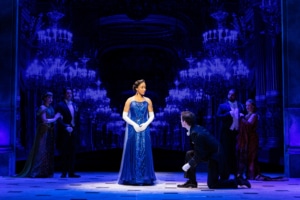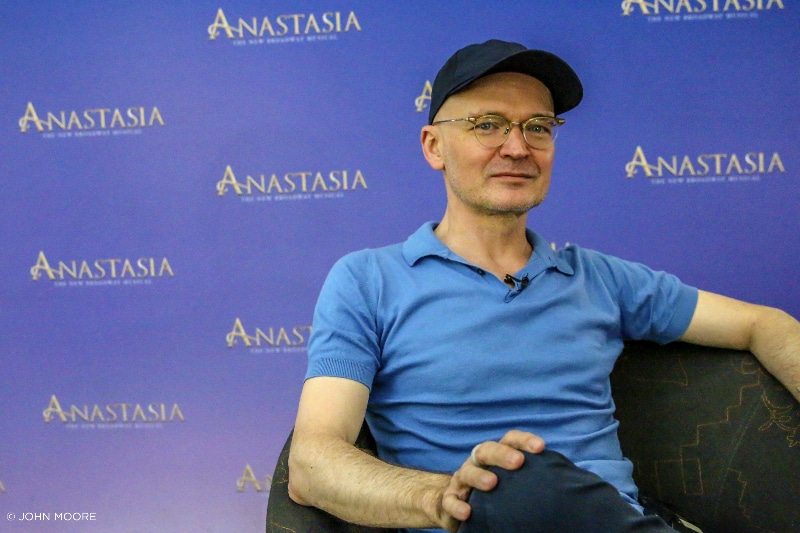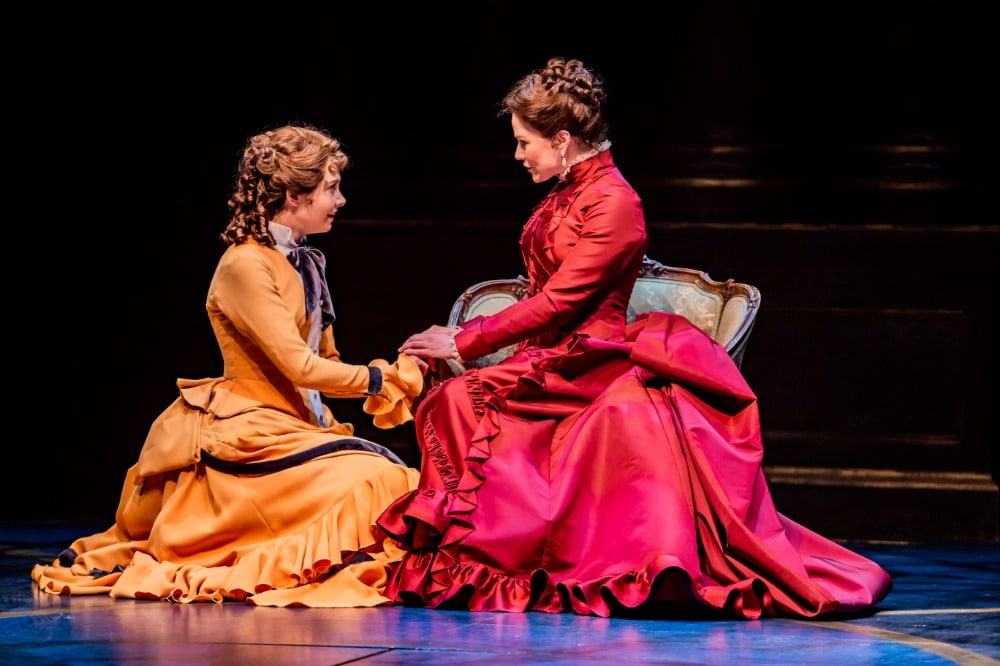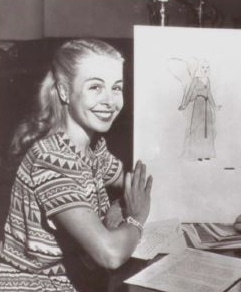DCPA NEWS CENTER
Enjoy the best stories and perspectives from the theatre world today.
Enjoy the best stories and perspectives from the theatre world today.
From the archives: this post was originally published on August 13, 2019
Video excerpts from John Moore’s conversation with Darko Tresnjak in Denver.
There’s a reason, says director Darko Tresnjak, his latest Broadway musical is not named Maria or Olga or Tatiana. No, it’s very intentionally Anastasia.

Veronica Stern (Anya) in the North American Tour of ANASTASIA. Photo by Evan Zimmerman for Murphy Made
“That name means ‘resurrection,’ Tresnjak told the DCPA NewsCenter while visiting Denver last week. And for 100 years, generations have wanted to believe – and in some cases have needed to believe – that somehow, the youngest daughter of Tsar Nicholas II, the last sovereign of Imperial Russia, survived the massacre that historians are certain claimed the entire Romanov family in 1918.
Not sisters Maria or Olga or Tatiana. Not little brother Alexei. Rather the Grand Duchess who, as Tresnjak points out, was named at birth to rise again.
“Russian history is complicated, but did those children deserve what happened to them? Absolutely not,” said Tresnjak. “It was a horrible crime. And so I think the hope that one of them survived, this magical child, is very appealing.”

The Company of the North American Tour of ANASTASIA. Photo by Evan Zimmerman for Murphy Made
Tresnjak and his team who adapted the popular 1997 animated film into a hit 2017 Broadway stage musical know what exactly happened to Anastasia. “We know where her ashes are,” said songwriter Lynn Ahrens. But the myth that the young woman might have somehow survived has persisted for all these years, even in Russia. The idea of Anastasia emerging from her amnesia to reclaim her name was one Tresnjak found deeply resonant in these contemporary times. And while the source film often showed young Anya being led, rescued or manipulated by the men around her, Tresnjak was determined that the stage musical would be very different.
“There were moments when we were revisiting the story where I would go, ‘Why can’t she defend herself?’ ‘Why can’t she come up with the idea to jump off the train herself?’ ‘She should take initiative.’ Long before the expression ‘Me Too’ came along, we all made this commitment that whether the woman in our story turned out to be a pauper or a princess, she will insist on being treated with dignity.”
The animated film presents con men training Anya to pretend to be a princess. “But if you think about it,” Tresnjak said, “what really happens in our musical is that all three of these men – Dimitri, Vlad and Gleb – are better men in the end because they met her. So our musical is actually about Anya teaching them how to be better men.”
DETAILS
Anastasia
April 14 – 16 • Buell Theatre
Tickets

Darko Tresnjak in Denver. Photo by John Moore.
Here are additional excerpts from John Moore’s conversation with Darko Tresnjak:
John Moore: So what’s it like having the best first name on Broadway outside of an action film?
Darko Tresnjak: I like my name. I’m known as Darko. I got nervous about that for the for the first time when the movie [“Donnie Darko”] came out, and I was like, “Don’t you steal my name!”
JM: So just to be clear: “Donnie Darko” was not based on your life story?
DT: No. But for every barista at Starbucks, it’s their favorite movie – and I’ve never even seen it. I feel bad about that because one of my friends is in it, Beth Grant [Kitty Farmer]. But now at Starbucks when they ask me about it, I go, “Yeah. I was named after it.”
JM: So what you’re doing here in Denver this weekend?
DT: Well, it’s been a few months since I saw the national tour of Anastasia, and I like to check in on all of the productions. So right now, the show is running here in Denver. It’s also running in Madrid. It’s running in Stuttgart. And we just went into rehearsals in the Netherlands. And after that, we open in Tokyo. And then after that, there are three more productions that haven’t been announced. So I like to check on my families. Occasionally it needs a tune-up.
JM: We just had your friend Jack O’Brien here in town doing the exact same thing with Roald Dahl’s Charlie and the Chocolate Factory. I think our audiences might be interested to know how this works because your tour opened all the way back in October. One might assume you have moved on to other projects and that tuning up is someone else’s job.
DT: There is an associate director, Sarah Hartmann, who’s wonderful. There’s also a wonderful stage management team. But the reason I check-in also is that I was there with the authors for years making this show. It was me and Lynn [Ahrens] and Terrance [McNally] and Stephen [Flaherty]. So I know why things are done the way they are. We often get new cast members, and I’m one of the few people who can explain, “Here’s why we do it this way. Here’s why it has to be that way.” So I freshen it up that way.
JM: What do you think is the reason for the enduring appeal of this particular myth? And I use the word myth intentionally.
DT: I like to use the word myth, too. I think historically we know what really happened. So our version is a theatrical romance, like Shakespeare’s late plays. I relate it to The Winter’s Tale and Pericles and Cymbeline. I think we love these stories about families who are torn asunder and then brought back together. Usually, they follow a young woman who’s in danger and you see her struggle with identity. You see her hopes and dreams. I think that’s part of the appeal. And what’s really interesting is in New York there was a huge international crowd who came to see the Broadway production. And there were young immigrant women from all around the world. And I realized, that’s part of the appeal. Because in the beginning, she’s all on her own and by the end, she’s elevated into the status of a princess. So it’s a romance. It’s meant to give hope.
JM: It seems to be all the things that appeal to you as a director, given your affinity for opera and Shakespeare and even the great physical comedy of A Gentleman’s Guide to Love and Murder. But you have options. What specifically made this something you wanted to spend a couple years of your life on?
DT: When I was a kid I had pneumonia, so I read the book “Nicholas and Alexandra.” I got interested in the Romanovs and soon I was researching them compulsively. I was fascinated by the history of hemophilia. The purest strains started in Switzerland. Looking at the royal families that still have it. How it’s spread around the world. So when this project came along, I was like, “Oh. I don’t need to do research – I’ve researched it my whole life.” That was part of the appeal. And being a Slav, I felt that gave me a certain amount of authority. I love directing anything that has to do with the period before the first World War and after. If you look at human history, it’s one of the biggest, most radical periods of change.
JM: Taking on this source material, you might have come out with many different kinds of theater. You could have had a searing historical drama. This is obviously based on a popular animated film that appeals to children. What do you think you and your dream team of collaborators ultimately came up with here?
DT: Well, there was only one way to tell the story that made sense to me. I don’t think the Romanovs were saints. I think Russian history’s very complicated. So I was like, “How do we do this given the fact that when I was hired we knew that there was a relationship to an animated movie?” And what I said from the beginning is, “This is filtered through the memory and the recollections of this daughter remembering the father and the mother and the family she lost and that she misses.” So the whole show is filtered. It can only be done that way through an idealized vision of a daughter who loved her family who did not see all the other things. That’s the only way I could do it. Because we all know that the story is much more complicated.
‘Whether this woman is a pauper or a princess, she insists on being treated with dignity.’ – Darko Tresnjak
JM: When I get to interview Lynn Ahrens, she told the story of the opening night of the pre-Broadway run of Anastasia in Hartford. She saw a group of five grown women enter the lobby dressed as characters from the movie in tiaras and ballgowns and wigs, nd she thought, “Oh, my God. They’re expecting to see the movie.” So after the performance, she went up to one of them and asked what she thought. And she said, “I realized that I grew up on the movie – and the musical grew up for me.” What do you want to tell people who come to see the musical what they should expect?
DT: I think it’s an entertainment. And I think it’s a smart entertainment. And I think that is something rare. It’s very hard to do something that’s for family audiences. If you think about it, that’s not easy at all. But our show begins with a little girl and her grandmother, and then we see the girl in her 20s. And then there’s the Count and the Countess who are in their 50s trying to rekindle their romance. So there’s something for every age range. That’s actually, a very tricky thing to do. And it goes to the source material and a lot of intelligent decisions made along the way.
JM: Talk some more about your dream team. Lynn Ahrens and Stephen Flaherty obviously wrote the score for the source movie, and 20 years later, they brought on Terrence McNally to write the book. What was is it like having that kind of pedigree working on this project with you?
DT: It was wonderful. I think Lynn and Stephen, through their connection to the animated movie, already understood who the audience was that was going to flock to see this show all around the world. But I think some of that was revelatory for Terrence. I told him, “Look, you’ve had this amazing career. And now this is going to be the youngest audience you’ve ever had” – and he just turned 80. How wonderful is that? That he’s reaching a whole new generation at that age? I have always thought that the scene between Anastasia and her grandmother – that’s where you have the mastery of Terrence McNally. Because actually that is what they call, in a musical, the 11 o’clock number. In our show, it’s not a song. It’s a scene between these two women. That’s why you need Terrence.
JM: And then the physical comedy in the song “The Countess and the Common Man” just hits people out of the blue.
DT: Well, Shakespeare knew how to mix comedy and tragedy even in the most devastating plays. Like in The Scottish Play, the Porter comes in and does a stand-up routine before Duncan’s dead body is revealed. I think it’s unfortunate that in our time we have the sitcoms, and then we have “NCIS.” Genre-wise, comedy and tragedy are often separated. But I think Shakespeare’s great late plays are both innocent and sophisticated at the same time. The first half of The Winter’s Tale is devastating, and then you go to Bohemia and it’s a complete lark and yet somehow it all comes together. So in our show, I call the song “The Countess and the Common Man” an entertainment. It’s a walk on the wild side, and it’s completely intentional. I watched it last night and the expertise of Edward [Staudenmayer] and Tari [Kelly] to do what they do in that song. It’s big and it’s broad – and it works. They brought down the house. You need experts to pull off that kind of comedy.

Allison Altman and Kate MacCluggage in ‘Anna Karenina.’ Photo by AdamsVisCom
JM: Tell us about working with Kate McCluggage, who just played Anna Karenina here for the DCPA Theatre Company.
DT: She’s been my leading lady for many years.
JM: We first saw her at the Denver Center performing in Noises Off about 10 years ago.
DT: Yeah, that’s how wide her range is. She was my Portia in The Merchant of Venice opposite F. Murray Abraham, who is famous for playing Salieri in the movie “Amadeus.” People might have come to see him, but they left as intrigued by her Portia, That was a great, scary performance.
JM: You’ve worked with just about everybody.
DT: There’s Patti Lupone and there’s Kevin Bacon and other famous actors. But I think my two Kates, Kate MacCluggage and Kate Forbes, are the greatest Shakespearians. Some people are more famous than others, but fame is not the ultimate criteria.
JM: You also worked with Jack O’Brien for seven years at the Old Globe.

Marge Champion was the artistic inspiration for Snow White.
DT: He is largely responsible for my career. Jack and the late Nicky Martin. Jack is amazing. He could give a master class in just a few hours, and people would learn enough for several years. I treasure every conversation I’ve ever had with him. There’s nothing that he’s ever said that I’ve forgotten. I think one reason Jack and I have a feel for the musicals that we do is partially because we’ve done so many Shakespeare plays. It’s actually a very similar skill set. And operas. But the person I owe everything to is Marge Champion, the legendary dancer who is about to turn 100 years old in four weeks. When she was 14 years old, Walt Disney drew her for Snow White. So she is Snow White. And she’s also The Blue Fairy in “Pinocchio.” And then she had all those MGM movies with her husband, Gower Champion, like Showboat with Ava Gardner. They were the Fred and Ginger of the ’50s. A few years after that, they saw Elvis Presley on TV and she said, “It’s over. The MGM musical is done. Let’s move to New York.” And with him, she then discovered Carol Channing and Hello, Dolly! and much more. She discovered me. So, yeah. I owe my career to her.
JM: I understand that she took a personal interest in you and started showing up at just about every show you did, true?
DT: She gave me The Segal Fellowship, which was a fellowship to direct at the Williamstown Theatre Festival. She said to me, like, “You need to do musicals.” And then she never missed anything I did. The last time I saw her was at the Drama Desk Awards. She was a presenter. She hasn’t seen Anastasia, though. She lives in a care facility in Los Angeles, but I really miss her.
JM: Any final thoughts about Anastasia?
DT: Yes. Come and see us.
